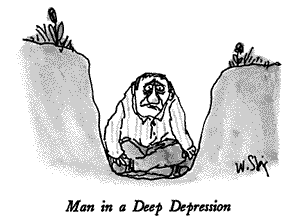
The Daily Mail has an interesting article today about the pro and cons of Cognitive Behavioural Therapy (CBT)
CBT is a short-term psychological treatment based on the idea that negative thinking and behaviour can trigger problems such as depression or panic attacks.Fearing the growing recession will cause a depression epidemic, the Government recently announced funding for hundreds more therapists trained in CBT. This is on top of the 10,000 new therapists promised two years ago.
During treatment, the therapist helps you identify these negative thoughts - and encourages you to work out a way of looking at things more positively. CBT is used to help with a wide range of mental health and physical conditions, including phobias, anger, relationship problems, sleep problems and eating disorders.
The process was developed by the American psychiatrist Aaron Beck in the Sixties. He believed that our emotions and moods were influenced by our patterns of thinking.
But rather than focusing on past events in your life such as your childhood - as most of the older psychotherapies do - CBT focuses on the here and now.
The Mail article features psychologist Oliver James who argues that this is a waste of money as CBT doesn’t work, while psychotherapist Derek Draper argues that it really does transform lives.
James argues that CBT is nothing but personal spin, so it is slightly ironic that the case for the defence is the ex-labour spin doctor Draper.
In the past I have had treatment for depression brought on my death of my father due to cancer and intolerable pressure at work. As well as being prescribed anti-depressants I also had sessions with a therapist, these sessions were in my opinion a waste of our time as she insisted on dwelling on my negative thoughts, poor self esteem and personal relationships rather than the real reason I was depressed which was crippling grief and an unsympathetic employer. The pills and being signed off work were what helped me recover and not the ridiculous hand-wringing navel gazing weeping sessions.
I now know the therapist was using CBT, It was a short course of sessions and involved filling in before and after questionnaires and I agree with James assertions.
If given no treatment, most people with depression drift in and out of it. After 18 months, those given CBT have no better mental health than ones who have been untreated.Interestingly James backs up his arguments with scientific studies and reports, while Draper who is a proponent of CBT just argues that it works for some people. James acknowledges that fact but his argument is that it doesn't work for sufficient numbers to warrant the investment and the money should be made on different treatments with a higher success rate even suggesting Cognitive Analytic Therapy, or the Hoffman Process.
Yet the claims that the Government has made for this method have been dishonest. CBT’s inefficacy becomes explicable once you understand just how shallow a form of psychiatric spin-doctoring it is.
The patient is taught a story to tell themselves, a relentlessly positive one. If the therapist is skilled, the patient persuades themselves and others that they are feeling good.
When tested, they often regurgitate the positive story, literally placing ticks in the right boxes of the questionnaires used by researchers to evaluate their mental state.
CBT does have some short-term effect: while undergoing it, people admit to fewer and less intense symptoms. But a few months after the therapy, their negativity forces itself to the surface and they cease telling the positive story.
Re-tested, they no longer tick the right boxes. The initial gains measured in CBT patients are often a simple parroting of what they have been taught, rather than expressing their real state.
Whilst driving home last week I caught the back end of an discussion about CBT on the BBC Radio4 PM program, where Oliver James was being interviewed. He made a coherent and strong argument and I found myself agreeing completely with everything he said.
Unfortunately it is now unavailable online but there are plenty of comment on the PM and iPM Blogs.
Just a note, Don't do a Google image search for CBT without a the safe filter on, will make your eyes water!
No comments:
Post a Comment